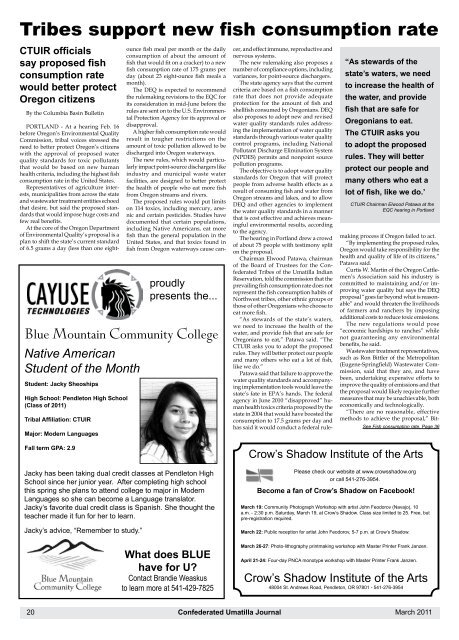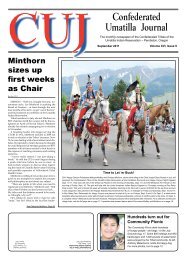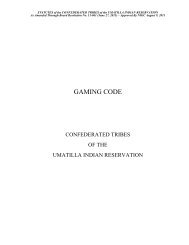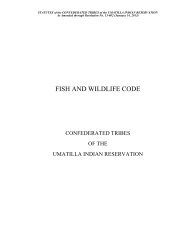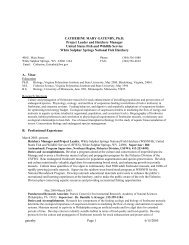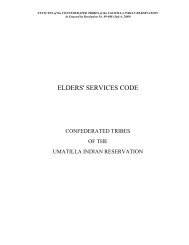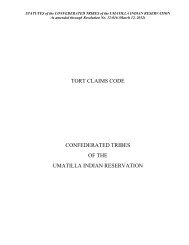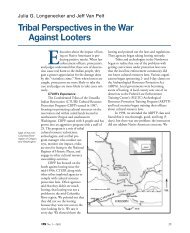Confederated Umatilla Journal - Confederated Tribes of the Umatilla ...
Confederated Umatilla Journal - Confederated Tribes of the Umatilla ...
Confederated Umatilla Journal - Confederated Tribes of the Umatilla ...
Create successful ePaper yourself
Turn your PDF publications into a flip-book with our unique Google optimized e-Paper software.
<strong>Tribes</strong> support new fish consumption rate<br />
CTUIR <strong>of</strong>ficials<br />
say proposed fish<br />
consumption rate<br />
would better protect<br />
Oregon citizens<br />
By <strong>the</strong> Columbia Basin Bulletin<br />
Blue Mountain Community College<br />
Native American<br />
Student <strong>of</strong> <strong>the</strong> Month<br />
Student: Jacky Sheoships<br />
High School: Pendleton High School<br />
(Class <strong>of</strong> 2011)<br />
Tribal Affiliation: CTUIR<br />
Major: Modern Languages<br />
proudly<br />
presents <strong>the</strong>...<br />
“As stewards <strong>of</strong> <strong>the</strong><br />
state’s waters, we need<br />
to increase <strong>the</strong> health <strong>of</strong><br />
<strong>the</strong> water, and provide<br />
fish that are safe for<br />
Oregonians to eat.<br />
The CTUIR asks you<br />
to adopt <strong>the</strong> proposed<br />
rules. They will better<br />
protect our people and<br />
many o<strong>the</strong>rs who eat a<br />
lot <strong>of</strong> fish, like we do.’<br />
CTUIR Chairman Elwood Patawa at <strong>the</strong><br />
EQC hearing in Portland<br />
PORTLAND - At a hearing Feb. 16<br />
before Oregon’s Environmental Quality<br />
Commission, tribal voices stressed <strong>the</strong><br />
need to better protect Oregon’s citizens<br />
with <strong>the</strong> approval <strong>of</strong> proposed water<br />
quality standards for toxic pollutants<br />
that would be based on new human<br />
health criteria, including <strong>the</strong> highest fish<br />
consumption rate in <strong>the</strong> United States.<br />
Representatives <strong>of</strong> agriculture interests,<br />
municipalities from across <strong>the</strong> state<br />
and wastewater treatment entities echoed<br />
that desire, but said <strong>the</strong> proposed standards<br />
that would impose huge costs and<br />
few real benefits.<br />
At <strong>the</strong> core <strong>of</strong> <strong>the</strong> Oregon Department<br />
<strong>of</strong> Environmental Quality’s proposal is a<br />
plan to shift <strong>the</strong> state’s current standard<br />
<strong>of</strong> 6.5 grams a day (less than one eightounce<br />
fish meal per month or <strong>the</strong> daily<br />
consumption <strong>of</strong> about <strong>the</strong> amount <strong>of</strong><br />
fish that would fit on a cracker) to a new<br />
fish consumption rate <strong>of</strong> 175 grams per<br />
day (about 23 eight-ounce fish meals a<br />
month).<br />
The DEQ is expected to recommend<br />
<strong>the</strong> rulemaking revisions to <strong>the</strong> EQC for<br />
its consideration in mid-June before <strong>the</strong><br />
rules are sent on to <strong>the</strong> U.S. Environmental<br />
Protection Agency for its approval or<br />
disapproval.<br />
A higher fish consumption rate would<br />
result in tougher restrictions on <strong>the</strong><br />
amount <strong>of</strong> toxic pollution allowed to be<br />
discharged into Oregon waterways.<br />
The new rules, which would particularly<br />
impact point-source dischargers like<br />
industry and municipal waste water<br />
facilities, are designed to better protect<br />
<strong>the</strong> health <strong>of</strong> people who eat more fish<br />
from Oregon streams and rivers.<br />
The proposed rules would put limits<br />
on 114 toxics, including mercury, arsenic<br />
and certain pesticides. Studies have<br />
documented that certain populations,<br />
including Native Americans, eat more<br />
fish than <strong>the</strong> general population in <strong>the</strong><br />
United States, and that toxics found in<br />
fish from Oregon waterways cause cancer,<br />
and effect immune, reproductive and<br />
nervous systems.<br />
The new rulemaking also proposes a<br />
number <strong>of</strong> compliance options, including<br />
variances, for point-source dischargers.<br />
The state agency says that <strong>the</strong> current<br />
criteria are based on a fish consumption<br />
rate that does not provide adequate<br />
protection for <strong>the</strong> amount <strong>of</strong> fish and<br />
shellfish consumed by Oregonians. DEQ<br />
also proposes to adopt new and revised<br />
water quality standards rules addressing<br />
<strong>the</strong> implementation <strong>of</strong> water quality<br />
standards through various water quality<br />
control programs, including National<br />
Pollutant Discharge Elimination System<br />
(NPDES) permits and nonpoint source<br />
pollution programs.<br />
The objective is to adopt water quality<br />
standards for Oregon that will protect<br />
people from adverse health effects as a<br />
result <strong>of</strong> consuming fish and water from<br />
Oregon streams and lakes, and to allow<br />
DEQ and o<strong>the</strong>r agencies to implement<br />
<strong>the</strong> water quality standards in a manner<br />
that is cost effective and achieves meaningful<br />
environmental results, according<br />
to <strong>the</strong> agency.<br />
The hearing in Portland drew a crowd<br />
<strong>of</strong> about 75 people with testimony split<br />
on <strong>the</strong> proposal.<br />
Chairman Elwood Patawa, chairman<br />
<strong>of</strong> <strong>the</strong> Board <strong>of</strong> Trustees for <strong>the</strong> <strong>Confederated</strong><br />
<strong>Tribes</strong> <strong>of</strong> <strong>the</strong> <strong>Umatilla</strong> Indian<br />
Reservation, told <strong>the</strong> commission that <strong>the</strong><br />
prevailing fish consumption rate does not<br />
represent <strong>the</strong> fish consumption habits <strong>of</strong><br />
Northwest tribes, o<strong>the</strong>r ethnic groups or<br />
those <strong>of</strong> o<strong>the</strong>r Oregonians who choose to<br />
eat more fish.<br />
“As stewards <strong>of</strong> <strong>the</strong> state’s waters,<br />
we need to increase <strong>the</strong> health <strong>of</strong> <strong>the</strong><br />
water, and provide fish that are safe for<br />
Oregonians to eat,” Patawa said. “The<br />
CTUIR asks you to adopt <strong>the</strong> proposed<br />
rules. They will better protect our people<br />
and many o<strong>the</strong>rs who eat a lot <strong>of</strong> fish,<br />
like we do.”<br />
Patawa said that failure to approve <strong>the</strong><br />
water quality standards and accompanying<br />
implementation tools would leave <strong>the</strong><br />
state’s fate in EPA’s hands. The federal<br />
agency in June 2010 “disapproved” human<br />
health toxics criteria proposed by <strong>the</strong><br />
state in 2004 that would have boosted <strong>the</strong><br />
consumption to 17.5 grams per day and<br />
has said it would conduct a federal rulemaking<br />
process if Oregon failed to act.<br />
“By implementing <strong>the</strong> proposed rules,<br />
Oregon would take responsibility for <strong>the</strong><br />
health and quality <strong>of</strong> life <strong>of</strong> its citizens,”<br />
Patawa said.<br />
Curtis W. Martin <strong>of</strong> <strong>the</strong> Oregon Cattlemen’s<br />
Association said his industry is<br />
committed to maintaining and/or improving<br />
water quality but says <strong>the</strong> DEQ<br />
proposal “goes far beyond what is reasonable”<br />
and would threaten <strong>the</strong> livelihoods<br />
<strong>of</strong> farmers and ranchers by imposing<br />
additional costs to reduce toxic emissions.<br />
The new regulations would pose<br />
“economic hardships to ranches” while<br />
not guaranteeing any environmental<br />
benefits, he said.<br />
Wastewater treatment representatives,<br />
such as Ron Bittler <strong>of</strong> <strong>the</strong> Metropolitan<br />
(Eugene-Springfield) Wastewater Commission,<br />
said that <strong>the</strong>y are, and have<br />
been, undertaking expensive efforts to<br />
improve <strong>the</strong> quality <strong>of</strong> emissions and that<br />
<strong>the</strong> proposal would likely require fur<strong>the</strong>r<br />
measures that may be unachievable, both<br />
economically and technologically.<br />
“There are no reasonable, effective<br />
methods to achieve <strong>the</strong> proposal,” Bit-<br />
See Fish consumption rate, Page 36<br />
Fall term GPA: 2.9<br />
Jacky has been taking dual credit classes at Pendleton High<br />
School since her junior year. After completing high school<br />
this spring she plans to attend college to major in Modern<br />
Languages so she can become a Language translator.<br />
Jacky’s favorite dual credit class is Spanish. She thought <strong>the</strong><br />
teacher made it fun for her to learn.<br />
Jacky’s advice, “Remember to study.”<br />
Crow’s Shadow Institute <strong>of</strong> <strong>the</strong> Arts<br />
Please check our website at www.crowsshadow.org<br />
or call 541-276-3954.<br />
Become a fan <strong>of</strong> Crow’s Shadow on Facebook!<br />
March 19: Community Photograph Workshop with artist John Feodorov (Navajo), 10<br />
a.m. - 2:30 p.m. Saturday, March 19, at Crow’s Shadow. Class size limited to 25. Free, but<br />
pre-registration required.<br />
March 22: Public reception for artist John Feodorov, 5-7 p.m. at Crow’s Shadow.<br />
What does BLUE<br />
have for U<br />
Contact Brandie Weaskus<br />
to learn more at 541-429-7825<br />
March 26-27: Photo-lithography printmaking workshop with Master Printer Frank Janzen.<br />
April 21-24: Four-day PNCA monotype workshop with Master Printer Frank Janzen.<br />
Crow’s Shadow Institute <strong>of</strong> <strong>the</strong> Arts<br />
48004 St. Andrews Road, Pendleton, OR 97801 - 541-276-3954<br />
20 <strong>Confederated</strong> <strong>Umatilla</strong> <strong>Journal</strong><br />
March 2011


